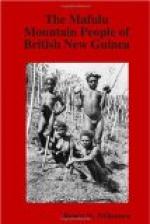The i and y are very difficult to distinguish, especially when they follow one another. Ex. iye or ye, or ie, tree; iangolo or yangolo, ear. Father Egidi wrote j for y.
The l and r are very difficult to determine. Ex. aliete or ariete, to salute; naul’i and naur’i, my eye. In the vocabulary l is used generally.
The s is often ts. Ex. tsivu and sivu; su(le) and tsu(le grass. Also in the future suffix t or ts. Ex. nati or natsi, I will eat.
II. Elision.
A great number of Fuyuge words terminate in an open syllable of which the vowel is generally e. This syllable is usually omitted at the end of a phrase, and nearly always when the following word commences with a consonant. But if the following word begins with a vowel the final e only falls away. Thus the complete form of a word is rarely used, except to avoid confusion, or for the sake of emphasis. The following are examples:
ovo(le), pig: ovol’ ovoge, boar, ovo momombe, sow.
ifa(ne), beautiful: ifa ta, very fine, ifan’ aka, less fine.
da(le), who? nu da? who art thou? dal’ aua? who is this?
i(nde), to give: ne i, give me, ne ind’ u, give it to me.
_-a(le)_, with: andal’ a? with what? indiv’ al’ ongai, cut with the knife.
a(le), here: a mo ma? must I put it here? al’ itatsi, he will sleep here.
u(ne), and: kitoval’ u kene, black parroquet and white, amb’ un’ ale, banana and sugar cane.
Note (1). The b in an elision sometimes changes to p. Ex. obe, bud, op’indie, to bud.
(2). Sometimes two syllables are elided: Ex. taume, tame, from which comes ovo ta, a tame pig, and ovo taum’ ifa, the tame pig is good.
(3). Words which do not end in e, rarely elide a final vowel, and never the last syllable. Ex. kuku, tobacco, kuk’ oko nei, give me a little tobacco; na, I, nu, thee, ongo at the foot of, na n’ ong’ ando, I am at thy feet; umbubi, wash, umbub’ u, wash him.
(4). Some verbs in _-ri_ or _-li_ however often omit this syllable. Ex. ivo(ri) to wipe, na ga kodig’ ivo, I have wiped the plates; tsimi(li), to lick, ama tsimi, lick the salt; itu(lili) to split, ol’ itu, split the wood.
In the grammar and vocabulary the syllable which may be elided is enclosed in a bracket, and in compound words and phrases the elision is marked with an apostrophe, as in the preceding examples.




